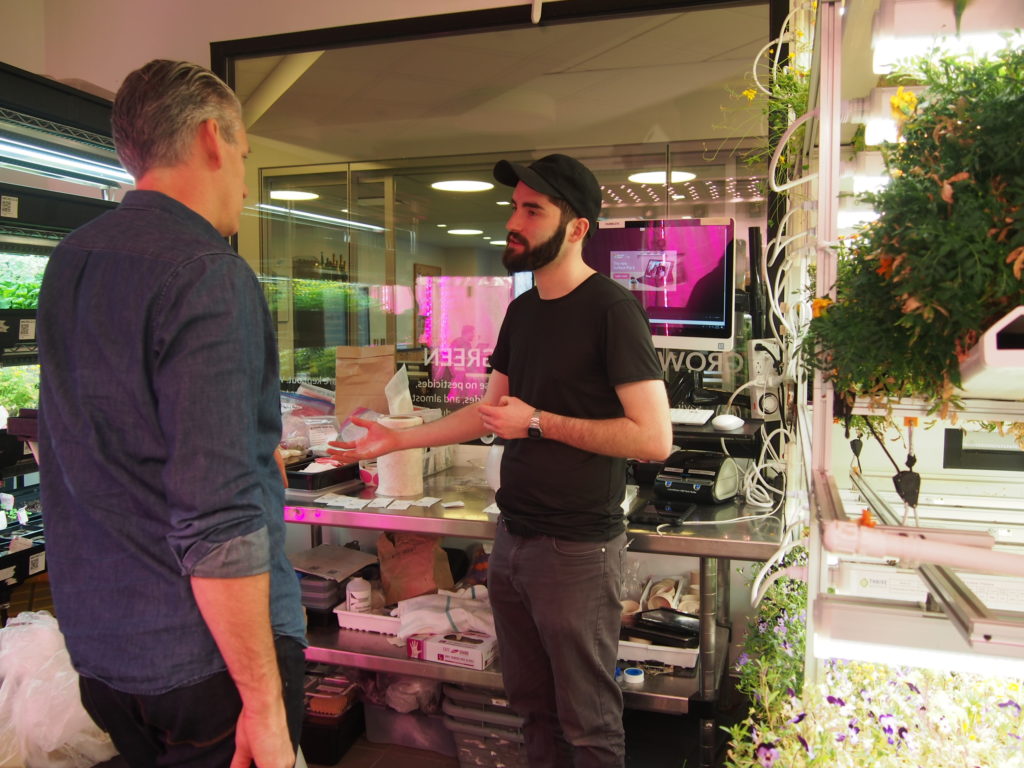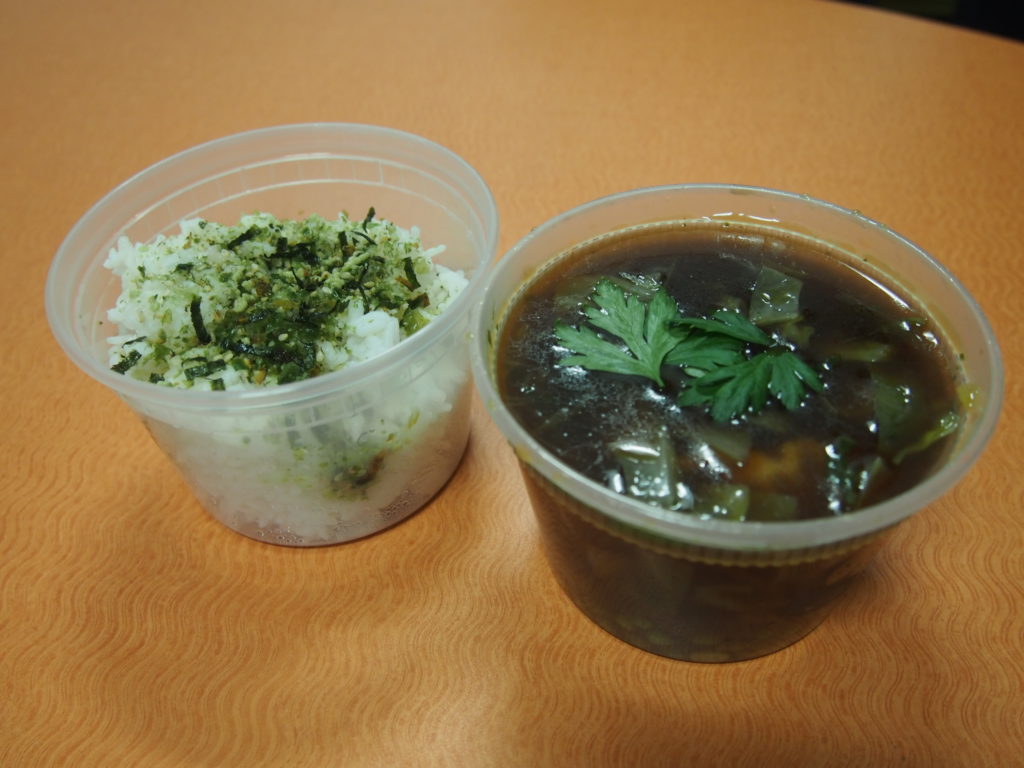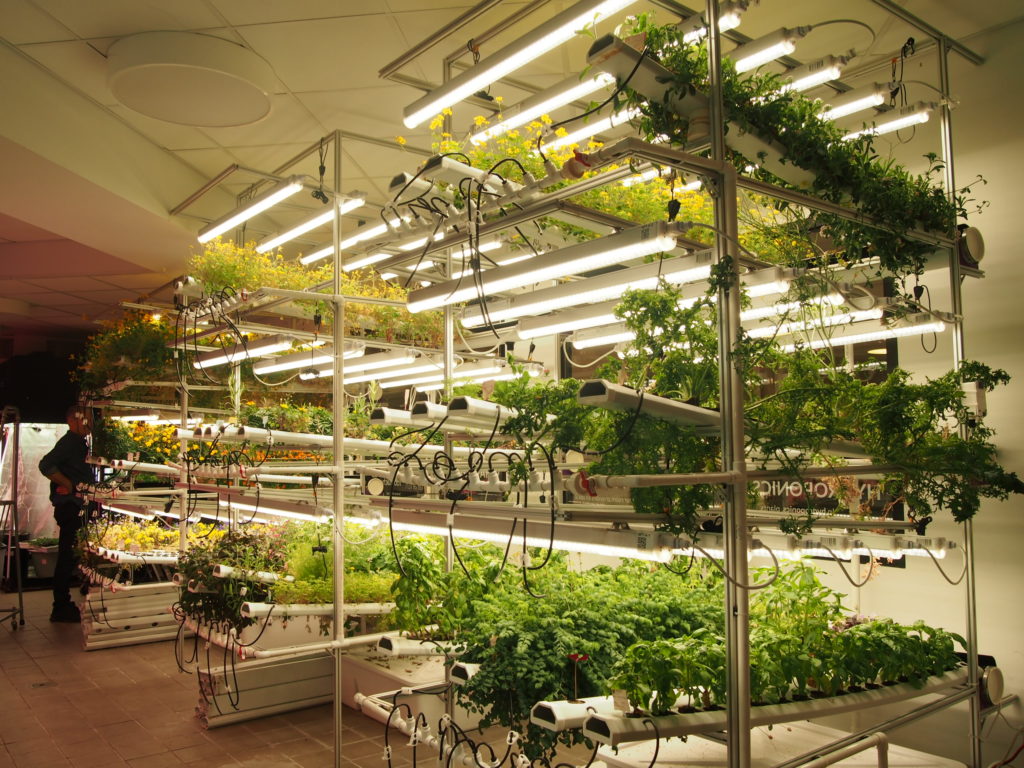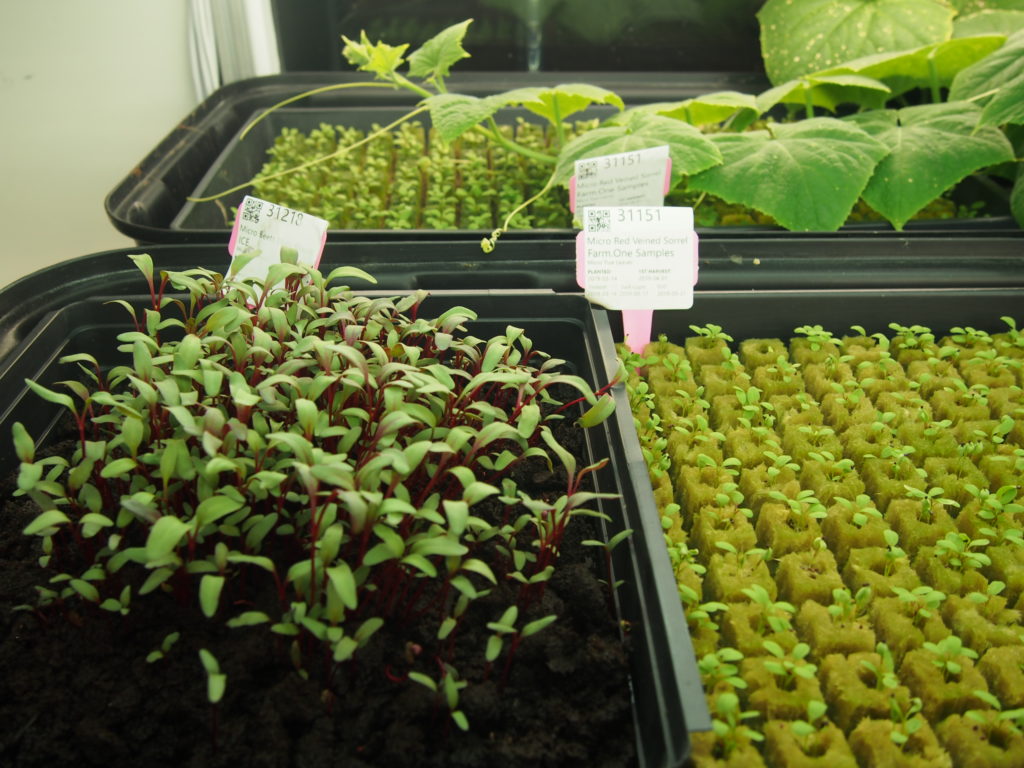
It was almost three p.m. when Caleb Raff wrapped up his daily maintenance tasks at a small indoor farm he runs at the Institute of Culinary Education (ICE) downtown—checking the plants, which included basil, thyme, begonia, and epazote; going through each reservoir underneath the plants to test the pH and nutrient level; and adding “secret sauce” to keep the reservoirs healthy. Raff works for Farm.One, a company that uses technology-powered urban vertical farms to grow a variety of customized edible flowers, herbs, and micro greens for the city’s fine-dining restaurants.
Raff was about to make the 15-minute walk to his company’s main location, a farm five times larger in the basement underneath the Michelin-starred restaurant Atera in TriBeCa. But first, he climbed up and adjusted a rotary switch to control the flowing speed of the solution. “Just make sure to lock the door before you leave,” he told Michael Herman, an ICE student and new volunteer, who finished seeding and started to clean the floor.
Raff was in a black T-shirt that matched his black cap, dark hair, and dark whiskers. He picked up his dark canvas backpack—home to his lunch bag, which contained one plastic container of white rice topped with seasoning seaweeds and another of home-cooked vegetable soup seasoned and topped with fresh parsley he harvested the day before.

His mealtime changes on a daily basis. “I typically bring my lunch if I have the time to prepare,” he said, “I brought my lunch today, but I’m working till pretty late tonight, so I probably won’t eat until like 3 or 4,” and that’s after he finished helping with an urgent task at the main location and sat down for a management meeting there.
Raff is the plant scientist and one of the six management employees at Farm.One, which was founded in 2016 by CEO Rob Laing, whose background was in web and graphic design. Born in Melbourne and educated in the U.K., Laing worked in Japan for almost a decade and founded a language translation tech startup before leaving to take a year off in 2015. He developed a passion for food, and eventually used an indoor farming technology he learned in Japan to grow a type of high-quality strawberry and launch Farm.One.
Raff, 24, studied literature at George Washington University. “I’ve essentially just learned on the jobs, both my previous jobs and the past two and a half years, almost, at Farm.One,” he said. He has always been into food and agriculture—growing up, he helped his mother and grandmother in their family garden in Providence, RI, and got his first job at around 13, helping the cooks at a local restaurant. “A lot of what I ended up doing was either processing the food that the farmers brought in directly, or occasionally we even go help them out and I started to get more involved, working with Arcadian Farm in Massachusetts and a couple of other places,” he said. He had worked on several farms since, both on a volunteer basis and as an employee.
The first job he took out of college in 2016 was in the kitchen at Farmers Fishers Bakers, a restaurant by the Potomac River in Washington, D.C., that serves farm-inspired American fare, plus sushi and cocktails. When he moved to New York in 2017, he started as a farmhand for Farm.One and learned a lot from his predecessor who had worked on a fixed set of light and water conditions suitable for most of their plants. He fell in love with his job before long.

Their goal is to replicate soil environment by adding natural nutrients, instead of cheaper synthetic or chemical nutrients most hydroponic farms are using, which preserves the flavor of the plants.
“I really started to get more and more interested in it”—doing a lot more reading and getting into the concepts, he said. And his experience working in restaurant kitchens helped, “especially restaurants where they are pushing finer cuisine, making these really beautiful things, sometimes those chefs can be a little hard to communicate with, so having that skill to understand what they are looking for, and to put it into an actual physical product, is really important. It’s something a little bit unique to what Farm.One does, because of how bespoke most of our products are.”
They grow over 500 varieties for around 40 restaurants, including Atera, Ai Fiori, Uchu, Jungsik, and Eleven Madison Park, as well as for private chefs. They plant the flowers and herbs based on demands and try to maintain the flavor while achieving visual requirements, sometimes as specific as a type of mini lemon basil with two pair of same-sized leaves. Their latest trendy flower is the pink Wood Sorrel, which has a fresh sour taste.

Raff is now in charge of the research and development farm in ICE, coming up with new things to grow and better ways to grow things, and monitoring plant health. His day usually starts at 7:30 in the morning, harvesting plants and transporting them in insulated duffle bags and specialized backpacks to the main location, to ensure that there’s no damage, and the quality of each is up to their standards before delivering them. That process usually takes the whole morning, and products that do not pass inspection are either composted or taken home by a member of the team.
Currently lives in Washington Heights with his girlfriend, Raff tries to cook whenever he can despite his tight schedule. “It’s healthier, it tastes better, and it saves money,” he said. “It’s not always possible. But for me it’s a passion, recently especially because I’ve been able to work with a lot of the stuff we grew here, so I have access to a lot of the fresh herbs and greens that are traditionally expensive or impossible to get.”
Tags: Caleb Raff, edible flowers, Farm.One, herbs, indoor farm, plant science, Rob Laing
Your Comments